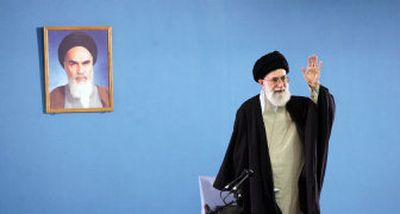Iran’s ayatollah vows retaliation

Escalating the threats between Washington and Tehran, Iran’s supreme leader, Ayatollah Ali Khamenei, warned Wednesday that his country would strike U.S. targets around the world in the event it is attacked over its refusals to curb its nuclear program.
“If the U.S. ventured into any aggression on Iran, Iran will retaliate by damaging U.S. interests worldwide twice as much as the U.S. may inflict on Iran,” Khamenei said in a speech to a workers’ assembly, according to the Iranian news agency IRNA.
His statement adds to a campaign of defiance by senior Iranian officials in advance of a report on Friday by the U.N. atomic watchdog agency, which analysts predict will cite Iran for defying U.N. Security Council demands to halt its uranium enrichment program.
In a spate of statements this week, Iranian officials have also threatened to cut oil production, export nuclear technology, bar international nuclear monitors, make their nuclear program entirely secret and withdraw from the Nuclear Non-Proliferation Treaty.
While Bush administration officials have said they have no plans to attack Iran, they have repeatedly said they have not ruled out that step.
U.S. military experts are confident that U.S. forces could carry out extensive airstrikes against Iranian targets, but there is disagreement about how much of a setback such raids could impose on the Iranian nuclear program, much of which is housed underground.
Two main options are under consideration, say people familiar with Air Force thinking. The first would be a quick series of strikes against several dozen nuclear-related facilities, lasting only a few days and followed by a U.S. statement that the bombing would resume if Iran retaliated.
The second option envisions a lengthier, more ambitious campaign of waves of strikes by bombers and cruise missiles aimed at hundreds of targets, hitting not just nuclear-related facilities but also the headquarters of intelligence agencies, the Revolutionary Guards and other key government offices.
Many experts worry that Iran, dominated by Shiite Muslims, would retaliate against U.S. and British forces in neighboring Iraq by mobilizing Iraqi Shiites. It might also attack U.S. and British installations in Saudi Arabia and Bahrain through the help of Shiites in those countries. In other scenarios, Iranian agents would stage terrorist strikes against civilians in the United States, Europe and elsewhere.